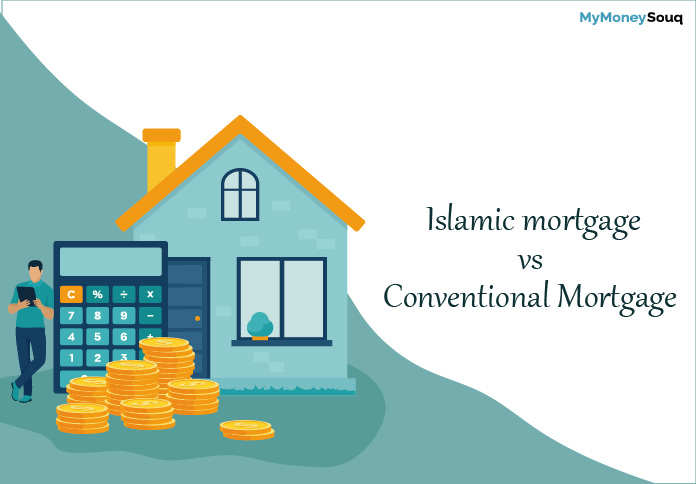According to Sharia law paying interest on the loan is legally prohibited. Therefore this is the reason that most of the money lending institutions offer Islamic mortgages that comply with Sharia law. Some lending institutions offer conventional mortgages as well. Let us understand the difference between Islamic Mortgages and Conventional Mortgages.
Islamic Mortgage
Islamic Financial Institutions are legally prohibited from charging interest on loans. Islamic home loans work differently as they do not charge interest. Among the several Islamic financial models, there are two key models used for home loans.
1. Murabaha Financing
2. Ijarah Financing
1. Murabaha Financing
Under Murabaha financing, lending institutions buy the property on behalf of the customer. It then re-sells the property at a profit. The buyer pays the lending institution in the form of monthly installments.
If a buyer does not make monthly repayments the collateral asset is protected by the Islamic bank. The collateral property is registered in the name of the bank. The property is protected by the bank until all the mortgage payments are paid off successfully. There are some banks that use tenant’s names on the title deed.
The main advantage of Shariah-compliant home loans is that there are no interest payments nor any payments are collected for late payments. The bank charges a fixed amount of fee.
Click here to know about How to achieve financial freedom
2. Ijarah Financing
Ijarah financing model is another Islamic Islamic Financing model. It is about a buy and lease back arrangement model. It is useful for those who are buying a property. The Ijarah process is an asset based process. It sets up lessor- lessee relationships.
A trust is set up which becomes the owner of the real estate property. In the name of trust the property is leased to the customer.
The customer pays down payment and also rental payments every month. By paying a rental amount every month, the customer ownership on the property increases. With each payment the ownership increases and after the entire amount is paid, the customer gets the ownership.
The Sharia law prohibits the collection of Riba or interest. Since the amount paid through Ijara is rent, it is acceptable. With the Ijara loan, the customer is paying rent for the property, the money paid is not considered as interest. Hence the payments made to the trust are not considered as interest and they are acceptable.
Click here to know about 5 ways to protect your finances in tough times
Conventional Mortgage
In conventional mortgages, banks will lend money and charge interest on the loan for purchasing a new home.
A Conventional mortgage includes principal and interest on the loan. The principal and interest on mortgage loans is paid off over 25 years. Conventional mortgage is also known as a repayment mortgage.
In the initial years of mortgage payments, paying off interest is set with a smaller part of reducing principal amount. As the loan term increases, the payment towards principal amount increases and the payment towards interest on loan decreases. In the initial years, the interest payments will be more and principal payments will be less.
Conventional Mortgage borrowers typically make larger down payments. The borrowers are more secure and are less likely to default.
Conventional mortgage loans have higher out of pocket expenses at closing the loan. Conventional mortgages are issued by private lenders, banks, mortgage companies and credit unions.
Conclusion
Islamic mortgages are offered by Islamic banks. These Islamic banks serve for public interest and their main objective is making ‘halal’ economic growth. They seek only to do with Sharia compliant industries. Whereas in Conventional mortgage loans, money is seen as a commodity. Interest is earned on the collateral assets. Banks will earn their profit from the interest charged on the amount borrowed.

